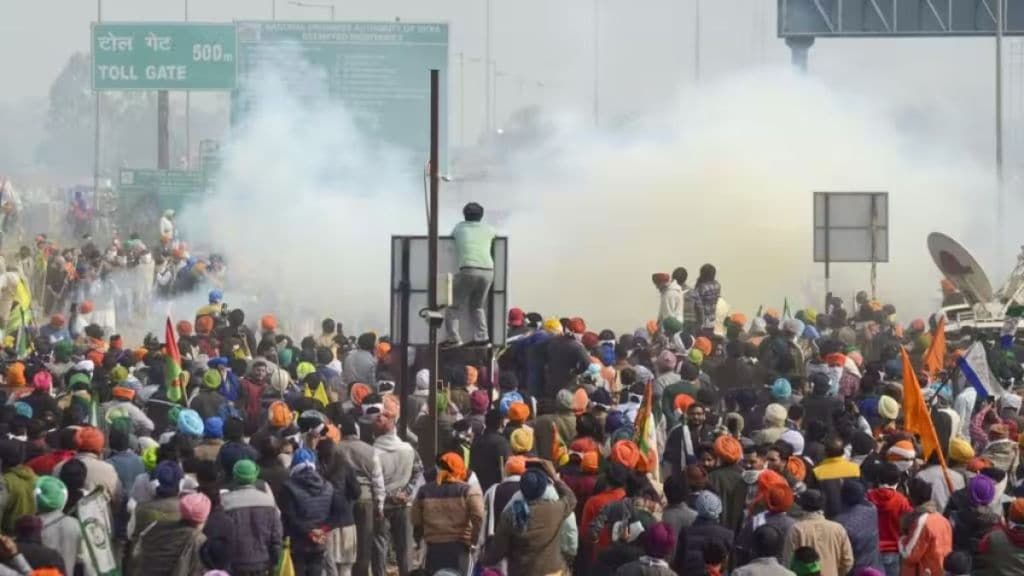Nearly three years after farmers’ groups called off their protests against the three agriculture laws brought in by the government, a section of the farmers’ collectives are again back on the streets. Sandip Das explains key issues associated with the farmers’ demands and the possible solutions
l Key demand of protesting farmers
One of the key demands of the protesting farmers is to provide a legal guarantee for procurement of all 23 crops under the purview of Commission for Agricultural Cost and Prices (CACP) at the minimum support price (MSP). In addition, the farmers are demanding debt waiver, pension for farmers and farm labourers, reinstatement of the Land Acquisition Act, 2013, and the country’s withdrawal from World Trade Organisation agreements.
In 2020-21, around 44 farmer organisations in Punjab, Haryana, and western Uttar Pradesh under the banner of Sanyukt Kisan Morcha (SKM), had blocked roads at Haryana-Delhi and Uttar Pradesh-Delhi borders for several months demanding a legal guarantee on MSP besides calling for revoking three contentious farm laws. The current protests are being spearheaded by a breakaway faction — SKM (non-political) — and the group lacks credibility.
l Did the government fulfill promises made earlier
After the sustained protests by farmers, Prime Minister Narendra Modi had, in November, 2021, announced revocation of the three farm laws. The farm laws had laid down the framework for contract farming, allowed inter-state and intra-state trade and commerce outside physical premises of markets notified under state Agricultural Produce Market Committee legislations, besides amendment of the Essential Commodities Act.
As part of the truce with farmers, in July 2022, the agriculture ministry set up a 26-member committee under the chairmanship of Sanjay Agarwal, former agriculture secretary. One of the mandates of the committee, which had three members of SKM (which did not join the panel) was to make MSP more effective and transparent and promote zero budget based farming aimed at crop diversification. The agriculture ministry did not specify the tenure of the committee. So far, according to a member of the panel, it has held 30 meetings with various stakeholders and the report of the committee will be finalised in the next couple of months.
l Are the demands of the farmers justified?
A legal guarantee for purchase of the crops covered under the MSP regime is unrealistic and will require setting aside huge funds for it. The total value of crops under MSP is estimated at `10 trillion and procurement by the government of all these crops may distort market dynamics. Officials have said that providing a legal guarantee has huge ramifications and a final decision can only be taken after consultation with the states.
In addition, currently the government purchases rice, wheat and pulses under MSP operations, mainly from the farmers across key surplus states — Punjab, Haryana, Rajasthan, Uttar Pradesh, Madhya Pradesh, Chhattisgarh, Odisha, Andhra Pradesh, Telangana and Maharashtra. Rice and wheat procured by Food Corporation of India and state government agencies are used for distribution under the free ration scheme — Pradhan Mantri Garib Kalyana Anna Yojana — and buffer stock. Similarly, under the Price Support Scheme and Price Stabilisation Fund, Nafed purchases pulses for creating a buffer stock. The Cotton Corporation of India commences MSP operations when prices fall below MSP. There is occasional procurement of oilseeds by agencies such as Nafed. Legalising MSP for all other crops would discourage private agencies from participation in the market. Prices of commodities are based on demand and supply and legal guarantee of MSP is simply not feasible in a free market. Accepting the farmers’ demand for free electricity would promote unsustainable farming practices and may result in depletion of groundwater resources.
l Looking for a middle ground
To pacify a group of protesting farmers, Union agriculture minister Arjun Munda and food minister Piyush Goel held two rounds of discussions at Chandigarh in the last one week. Munda has said the government is willing to discuss all issues with an ‘open’ mind and the feasibility of granting legal guarantee to MSP is being discussed extensively by the panel and the report is being prepared. It is willing to set up a separate committee or expand the scope of the existing panel if farmers end the agitation. It has also pointed out that it is directly purchasing pulses such as tur from the farmers at market prices which are currently ruling above the MSP.
Munda has asked farmers’ representatives to participate in the deliberations of the MSP panel and cautioned them to be ‘alert’ about elements who could hijack their protest for political benefits.


